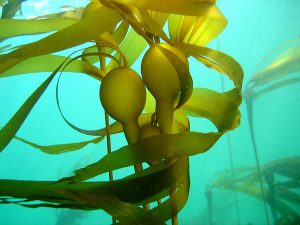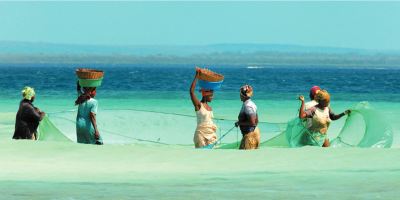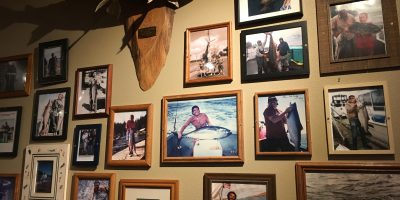By carter johnson, ethan seay, & Max urbanek, UW Undergraduate students majoring in Aquatic and Fishery sciences and biology
Every healthy relationship has one thing in common: communication. But the current relationship between scientists and policymakers clearly isn’t where it should be.
In the East, it could be the COLDEST New Year’s Eve on record. Perhaps we could use a little bit of that good old Global Warming that our Country, but not other countries, was going to pay TRILLIONS OF DOLLARS to protect against. Bundle up!
— Donald J. Trump (@realDonaldTrump) December 29, 2017
“How could global climate change be real if it’s still cold where I live?”, Trump asks, along with a mob of climate change skeptics. For many Americans, the consequences of global climate change are absent in their everyday lives, and doomsday warnings from climate scientists can come off as exaggerated, or ‘fake news’. This disparity in perspective is due in part to a lack of communication between the scientific community and the public at large. Scientists require effective communication to policymakers, media, and the public to turn their research into useful information. But whether or not scientific knowledge is seen as “useful” depends on whom you ask.
Useful scientific information is relevant, credible, and legitimate in the eyes of people who rely on the results. Society values research “not for what it is but what it’s for.” In other words, the user is concerned with how scientific research benefits the collective group more than the science itself.
It’s not you, it’s me…
The challenge with generating useful knowledge is that the outputs of the research must match the needs of the users. When the supply of information matches, everyone is happy and new knowledge can be applied to things like policy decisions, product development, or social services. When there is a mismatch, there is a problem. The “missed opportunity matrix” below describes this relationship of the supply and demand of scientific information.
Missed opportunity matrix from “Science, information, and policy interface for effective coastal and ocean management (MacDonald et al. 2016).
Finding common ground.
Scientists and society value research differently. In general, science values research that creates new information, whereas users value research that solves a problem. A deep-sea expedition involves mostly science values; knowledge for the sake of knowledge. A stock assessment of a commercially-important salmon population addresses user values; knowledge that applies to a specific problem – for example how many salmon can be caught next year. While it can be difficult for scientists and information-users to see eye to eye, there are ways of designing research so that it is worthwhile for everyone involved. As long as there is communication between users and scientists, everyone’s needs can be met. But, what if there isn’t enough communication?
Be a better listener.
Recent work by Dr. Angela Bednarek, the project director of environmental science at The Pew Charitable Trusts, shows that focusing on communication gaps between scientists and policymakers can improve scientific usefulness. Direct and clear communication is important, but both scientists and decision makers are often too busy to devote extended time to understanding one another.
Dr. Bednarek suggests that creating an intermediary body, called a “boundary organization”, could translate and mediate scientist/policymaker relationships. These organizations could be “helpful where there aren’t those relationships” between scientists and policymakers, or where “there’s a lot of conflict, and they don’t know how to connect with each other”, says Dr. Bednarek. Boundary organizations can help span that gap. For researchers who already have relationships with decision-makers, facilitating could be as easy as allowing the relationship to become more two-sided. Not all systems will need their own boundary organization; the goal, Dr. Bednarek says, is to try “reframing it so it’s more of a dialogue.”
“We’re not telling the decision-makers or the researchers what to do, we’re providing them options.”
-Dr. Angela Bednarek
Success Stories
Dr. Bednarek is involved with one of these boundary organizations, the Lenfest Ocean Program, which funds scientific research on policy-relevant topics concerning the world’s oceans, and communicates the results to decision-makers and other interested audiences. In addition to facilitating communication, the program follows up on its projects to evaluate how effective they were in influencing a decision. However, Dr. Bednarek explains that the Lenfest Ocean Program is not interested in pushing any kind of political agenda. “One of the important things that I try to emphasize is that Lenfest is about informing policy, not changing policy. We’re not telling the decision-makers or the researchers what to do, we’re providing them options.”

The Lenfest Ocean Program supported research on bull kelp harvest that helped inform policy decisions in the Pacific Northwest (Photo by Jackie Hildering)
The Lenfast Ocean Program’s efforts have successfully connected science and policy all over the world, from the European Union to South America. One project in the Pacific Northwest funded research that discovered that kelp harvest methods were preventing reproduction. The results of this research were successfully communicated to policy-makers, and led to an administrative moratorium on commercial kelp harvest in Oregon state in 2008. Lenfest has also assisted in evaluating the effects of longline fishing in Hawaii and establishing catch limits for sharks in China’s fishing fleets.
Can we make it work?
In the Information Age, it is easier than ever for people to access coverage of issues that they care about. Unfortunately, it can be just as easy to find misinformation as it is to find science-based facts. As a result, the production of quality, accessible science is more important than ever and intermediaries like the Lenfest Ocean Program can help. Reducing unnecessary jargon and listening to society’s concerns are easy steps to make research more accessible and credible. The more informed society is as a whole, the better chance that policy decisions will be grounded in facts – from small-scale local management decisions all the way up to national and international policies. It’s not going to be easy, but fostering a healthy and productive relationship between scientists and policy-makers needs to happen. If not for us, then for the kids.
References and Further Reading:
Bednarek, A. T., Shouse, B., Hudson, C. G., & Goldburg, R.. 2015. Science-policy intermediaries from a practitioner’s perspective: The Lenfest Ocean Program experience. Science and Public Policy 43(2): 291-300.
Cash, D.W., Clark W.C., Alcock F., Dickson N.M., Eckley N., Guston D.H., Jager J., & Mitchell R.B. 2003. Knowledge systems for sustainable development. Department of Earth and Planetary Sciences, Harvard University, Cambridge, MA.
Gibbons, M. 1999. Sciences new social contract with society. Nature 402: C81-C84.
MacDonald, B. H. et al. 2016. Science, information, and policy interface for effective coastal and ocean management. Boca Raton, FL: CRC Press.
Kelp photo: https://jackiehildering.smugmug.com/








Leave a Reply